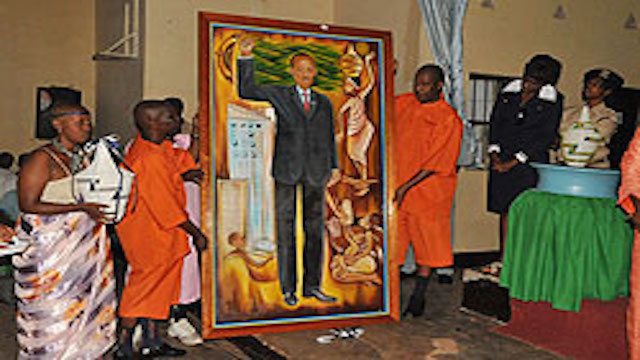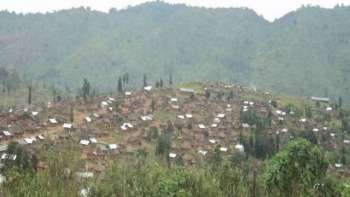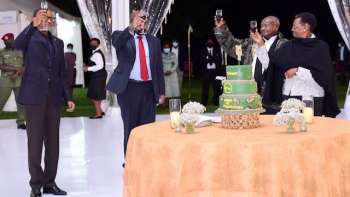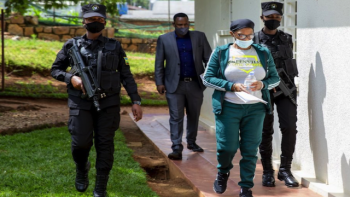"Rwanda, while it has made remarkable progress over the last decade against all odds –increasing economic growth and youth literacy, dramatically lowering child and infant mortality –has not kept pace with progress on the political front. There have been unmistakable efforts in that country to stifle critical voices in civil society, in the media, and in the political opposition. And those who speak out often live in fear and face harassment or intimidation. Some have simply disappeared. While we celebrate Rwanda’s progress, of course, sustaining it will require trust in the people and the respect for democratic process and fundamental human rights.
President Kagame has repeatedly stated his commitment to respect the constitutional term limit, and the United States expects him to keep his word," Under Secretary of State for Civilian Security, Democracy, and Human Rights Sarah Sewall during her trip to the Democratic Republic of the Congo. She
has been in the region since Oct 18 and will remain until October 24, 2015.
Sarah Sewall was referring to the push by Rwandan dictator Paul Kagame and other dictators in the region to change the constitution of their countries to remain in power. Her call follows one made last week by the special envoy of the United States to the Great Lakes, Thomas Perriello, urging all leaders of the region to respect the constitutions of their countries.
General Paul Kagame is expected to ignore the calls by the United Stated Government and go ahead with the change. In a recent interview with News Africa Magazine published on October 20, 2015 (Kagame: I have not asked anyone to change constitution for me ), he tried to argue, without convincing, that he never sought to change the constitution but his arm is being twisted by the demands in supplication from the "Rwandan People".
Hardly convincing.
On one question News Africa Magazine's Baffour Ankomah asked:
Q[News Africa Magazine]: The people of Rwanda, as I understand it, are saying this man has been a good president for us, we still want him to continue. What’s bad about this?
Paul Kagame responded:
A[Paul Kagame]: I find nothing wrong with that, and that is why I am saying people are distorting the whole argument when they say Kagame wants a third term. I have told nobody that I want anything, believe me. As such I have simply stayed away from the whole thing. I have not been part of it and the simple reason is, I want to really be sure of what is going on.
I have had discussions with my party cadres, 2,000 of them in one room, made up of the who’s who in our party leadership, and I have told them: “Please be sober about this, let’s be sure that we are dealing with the real thing, and not people trying to influence this or that for their own interests.” I said to them: “I want to be sure about this, I want to be sure about the process, about the facts, about the realities.” That is when I will come up with my own decision, a decision which will come to me as a person who is able to make his own decisions.
This is why I have left the 3.7 million people and the many others to play it out, to convince themselves and convince others that what we are dealing with is the real thing and that it is not fake or manipulated. This is why I am saying even to you as a journalist and an analyst and somebody coming from outside our country, that you are doing us a good service in trying to understand the nuances and the whole detail of this issue, so that we know the reality of what we are dealing with. And maybe it is going to end up being another case where Rwanda charts its own course and lives by it and reaps the benefits of it, or faces the consequences.
The answer appears neat and convincing to those who do not know Rwanda and how the Rwandan Patriotic Front repressive system works. In fact, what Paul Kagame failed to mention is that, it is his paid plethora of ruthless intelligence and security services agents who roam and terrorize the countryside, who went house by house, in the middle of the night, with lists of household members and asked them to sign the petitions. That is how the 3.7 million people said YES to the constitutional change. According to the sources in Rwanda, even the 10 people who did not sign are known, and were pre-approved by Paul Kagame's cold-blooded agents.
The People Forced My Hand into Remaining in Power, Paul Kagame Complained.
What is interesting is that, like other dictators before and around him, he would like to convince himself that the people love him and are asking him to stay in supplication. That is why he, powerless, grudgingly will remain in power, as a sacrifice to please the people, falling to knees in supplication.
Q[News Africa Magazine]: That may be true, but how do you convince people that the push for a third term is not being remote-controlled by State House?
A[Paul Kagame]: I will tell you. In some cases in Africa you may have a leader who gives the impression that people want him to stay, but in reality they want him to go. He may present himself and say, people want me. That is how sometimes it has led to problems in certain countries.
But if there was a way of knowing the truth and the people really want him to stay, there should be no problem. The problem only comes when some leaders, and their friends and families, are the ones who engineer the push. But I can assure you that in our case the push is not coming from me or my family or friends.
Poor and Powerless Kagame who Has Always Been Forced to be President, When He does not Want to.
Tennessee Senator Cary Estes Kefauver once said, while explaining why some people want to be President, even in the democratic countries like the United States of America: "Presidential ambition is a disease which can only be cured by embalming fluids". If he was right in democratic societies, how is this the truth in African dictatorships, where the only obstacle is how good the army and security services are and the West closes its eyes.
News Africa Magazine interview with Paul Kagame of Rwanda is telling in many ways and reinforces how Estes Kefauver's assessment could apply to Paul Kagame. The two questions below with Paul Kagame's shots to the puppet that who warmed his throne, Pasteur Bizimungu, appears to underline the fact:
Q[News Africa Magazine]: In fact, I read that it has happened before?
A[Paul Kagame]: Yes. So I was even preparing to say, don’t be surprised to come to me and I say no, because that has happened before by the way. You remember after the genocide in 1994, I was not the first president. But everything qualified me to be, meaning everybody wanted me to be; between the opposition and our party, they wanted me to be.
You remember there was an earlier Arusha Agreement, which had brought in opposition parties and our group, the Rwandan Patriotic Front (RPF). The RPF almost took it for granted that I was the president because I was the commander of the forces that fought in the bush and I was also number two in the political leadership of the RPF, which by the way also happened by default because our first leader had been killed at the beginning of the war in October 1990.
In fact when our first leader [Fred Rwigyema] was killed, I was number three. There was the chairman who was the commander who got killed, there was the vice chairman [Pasteur Bizimungu], and I was there.
When the commander and chairman died, everybody came to me and said you must take over. I said “No, there is the vice chairman”. And what made it difficult for us was that when the vice chairman heard that the chairman had died and there were problems at the warfront, he kind of ran away. He went into hiding literally. He actually went to Tanzania, lay low, and disappeared.
Q: And you didn’t want to take over?
A[Paul Kagame]: No. I told them to go and look for the vice chairman. So they went to look for him, and after a hard struggle they got him to accept coming back. That was during the war. Then after the war, when everybody had assumed that I was going to be the president, I said, “No, I am not prepared, give me any other role and I will play it.” So that is how our former president, Bizimungu, came in, until after 6 years when he ran into problems with parliament for the things he had done. I became president in 2000.
But for me this whole issue of being president, clearly doesn’t appeal so much to me. But for all that I have done to serve my people, and even to serve my own conscience, if the people say to me, “President, you are tired or we are tired of you, you must go”, I will go that very day. I wouldn’t give anybody trouble at all.
And this is what makes me say if the current push to make me stay plays out to my satisfaction, that there are no games being played, that it is genuine, and also people are not becoming too dependent on me, and that they have a genuine problem, maybe they need time to choose another leader but now is not the time, I remain open to the idea of staying. But I am not the one driving it.
















